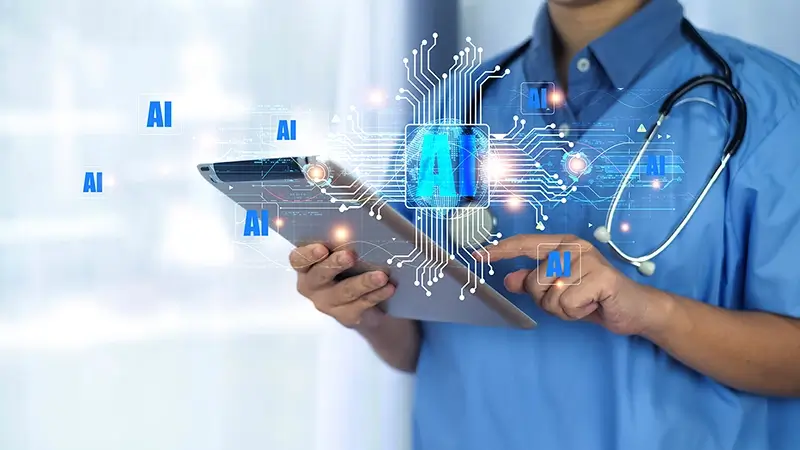Learn About Augmented Reality in Retail
Augmented Reality offers significant benefits for your business, such as enhancing your marketing strategy and improving the customer experience....

Artificial intelligence has the potential to help doctors manage the health of millions of patients and medical companies more efficiently manage their customer base.
The healthcare industry is changing rapidly. Technology and patient preferences are reshaping healthcare. A report by PwC indicates that patients are behaving like consumers and expect healthcare companies to provide them with the kind of experience they find in other sectors, such as retail or banking.
In response, healthcare providers are embracing a variety of technological advancements in new physical and virtual spaces. They are also creating apps with diverse functionalities, such as the ability to monitor vital signs or access reliable medical advice at any time.
Furthermore, medical companies are making significant advances in biotechnology and diagnostic technologies. This allows for the development of personalized therapies for individual patients based on their genes, environment, and lifestyle.
>> You may be interested in reading Learn About Augmented Reality in Retail
Artificial intelligence (AI) is being integrated into the medical industry, just as it is in many other sectors. So, how can AI assist doctors? The possibilities are vast. From diagnosis and treatment to scientific research, autonomous systems are learning to support healthcare professionals and their patients effectively.
Artificial intelligence can assist doctors in various ways. Some examples include:
Diagnosis: AI can help doctors diagnose diseases more quickly and accurately because it analyzes large amounts of medical data and compares it with similar cases in their database. Machine learning algorithms can identify patterns and trends that human doctors may miss.
Treatment Planning: AI can help doctors develop more effective and personalized treatment plans for each patient by analyzing their medical history data, including genetic information and diagnostic test results.
Patient Monitoring: AI systems can monitor patients in real time and alert medical staff if there are signs of a complication or if the patient needs additional care.
Task Automation: AI can help doctors automate repetitive and administrative tasks, such as recording patient data, allowing them to focus on more important tasks and improve efficiency.
Medical Research: AI can help medical researchers analyze large amounts of data and discover new ways to prevent, diagnose, and treat diseases.
>> You might also read Global Supply Chain - What Benefits Does It Bring?
If patients behave like medical consumers and expect a more consumer-oriented experience, healthcare companies will need to strengthen their resource planning and management. Enterprise Resource Planning (ERP) software, a widely used type of software for managing all kinds of daily business activities, plays a key role in this approach.
ERPs are also undergoing a complete transformation, thanks to artificial intelligence. The valuable thing about this transformation is that artificial intelligence allows ERPs to be capable of continuous learning. How? By recognizing patterns that arise when tasks are repeated. The result is an optimization of business administration functions, benefiting both the company and its users:
Artificial intelligence in new ERP systems has the potential to revolutionize the business management software market. The systems work more closely with reality.
This reduces the distance between physical events and digital data. This advantage is invaluable for sectors like healthcare. We will soon be witnessing a world of intelligent ERP, where human intervention will only be necessary in critical exceptions.
Healthcare stakeholders are exploring methods to create value and reduce costs, presenting significant opportunities for utilizing AI. Despite the challenges of evolving regulations, risk compliance issues, and internal capability gaps, recent survey responses suggest that more payers, health systems, and HST organizations are advancing in implementing use cases across various functions.
In a survey conducted by the consulting firm McKinsey indicated that the majority of respondents to the last quarter 2024 survey said their organizations have either implemented gen AI use cases or begun to develop proofs of concept.

Data Source: McKinsey Consulting
Among respondents implementing generative AI, partnerships have emerged as the primary strategy for adoption. The 61% indicated they plan to collaborate with third-party vendors to develop customized solutions. In contrast, 20% of respondents intend to build generative AI capabilities in-house, while 19% prefer buying off-the-shelf solutions. Among those choosing to partner, 58% are looking to their existing IT solution partners, and 46% are also considering partnerships with hyperscalers, motivated by these vendors' expertise in data management.
The advancement of generative AI is crucial in the healthcare sector, and leaders must proactively position their organizations for the future. Successful implementations demand a robust value-driven strategy, strong delivery capabilities, and effective organizational management.

Augmented Reality offers significant benefits for your business, such as enhancing your marketing strategy and improving the customer experience....

Chemical sectors are at the heart of digital transformation, creating essential products ranging from medicines to medical equipment. A good...

A distributed supply chain helps improve production and reduce costs across different territories. However, the COVID-19 pandemic exposed weaknesses...